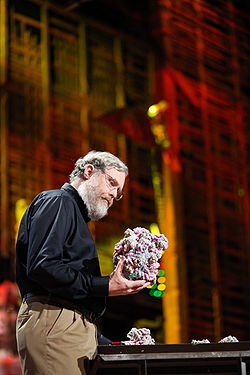IEEE Computer Society and GBC/ACM
7:00 PM, Thursday, September 20, 2012
Broad Institute Auditorium (formerly MIT building NE-30)
Computer-Aided-Biology -> Biology-Aided-Computers
George Church
Director of the Center for Computational Genetics and Professor of Genetics at Harvard Medical School
Professor of Health Sciences and Technology at Harvard and MIT
Associate member of the Broad Institute
The Omics data explosion is leading to ever higher quality computational models and has already led to computer-aided-design of synthetic systems to swiftly test these models. The exponential improvement in the cost per base pair of sequencing and synthesis of DNA (currently running at 8X/year) is now at the point where it is beginning to overwhelm the 1.5-fold/yr changes in computing efficiency, storage density, and I/O. These developments have the potential to enable new classes of neural systems. DNA nanostructures have already led to compact storage and simple nanorobots, which integrate sensors, logic and actuators capable of specific impact on cancer and T-cells. Such methods may soon also enable new kinds of complex circuits.
DNA is particularly suitable for immutable, high-latency, sequential access applications such as archival storage. DNA storage is very dense and is not restricted to a planar layer, and is often readable despite degradation in non-ideal conditions over millennia. Finally, DNA's essential biological role provides access to natural reading and writing enzymes and ensures that DNA will remain a readable standard for the foreseeable future.
Recent work at the Church lab has been exploring the technologies needed to make DNA programming a reality. More information is online at https://radar.oreilly.com/2012/08/dna-storage.html and https://www.sciencemag.org/content/early/2012/08/15/science.1226355.full . This talk will report on recent experiments with DNA storage and discuss future use of DNA as a storage, computation and communication mechanism.
George Church is Professor of Genetics at Harvard Medical School, Professor of Health Sciences and Technology at Harvard and MIT, an associate member of the Broad Institute, and Director of the Center for Computational Genetics. He graduated from Duke University with degrees in Chemistry and Zoology, co-authoring research on 3D-software & RNA structure with Sung-Hou Kim. His PhD from Harvard (with Wally Gilbert) included the first direct genomic sequencing method in 1984. He helped initiate the Human Genome Project while working Biogen Inc. and as Monsanto Life Sciences Research Fellow at UCSF with Gail Martin. He invented broadly-applied concepts of molecular multiplexing and tags, homologous recombination methods, and array DNA synthesizers. Technology transfer of his work on automated sequencing & related software to Genome Therapeutics Corp. resulted in the first commercial genome sequence (the human pathogen, H. pylori, 1994). He has served in advisory roles for 12 journals (including Nature Molecular Systems Biology) and 5 granting agencies. Innovations in DNA reading & writing & allele replacement in cells lead to current research & commercialization in human genomics (Complete Genomics, PersonalGenomes.org, 23andme, Knome) & synthetic biology (SynBERC, Joule, LS9) & new ethics/security strategies. See https://en.wikipedia.org/wiki/George_Church and https://arep.med.harvard.edu/gmc/ for more details.
George is also the co-author of a new book "Regenesis: How Synthetic Biology Will Reinvent Nature and Ourselves". More information is online at https://www.amazon.com/dp/0465021751 .
This joint meeting of the Boston Chapter of the IEEE Computer Society and GBC/ACM will be held in the Broad Institute Auditorium (MIT building NE-30). The Broad Institute is on Main St between Vassar and Ames streets. You can see it on a map at this location. The auditorium is on the ground floor near the entrance.
Up-to-date information about this and other talks is available online at https://ewh.ieee.org/r1/boston/computer/. You can sign up to receive updated status information about this talk and informational emails about future talks at https://mailman.mit.edu/mailman/listinfo/ieee-cs, our self-administered mailing list.For more information contact Peter Mager (p.mager at computer.org)
Updated: Sept 7, 2012.
